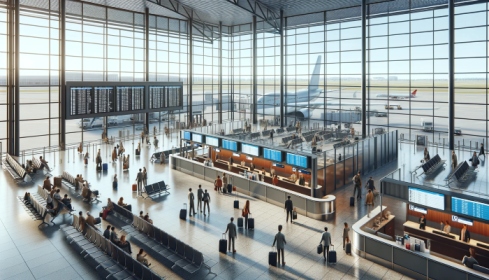Monday, September 16, 2024 Metaverse Technology Heralds a Transformative Shift in Saudi Arabia’s Hospitality Industry In recent developments, the Metaverse has emerged as a transformative force in Saudi Arabia’s hospitality sector. Recognized as a core organizational technology for 2024 and beyond, the Metaverse is set to redefine engagement strategies across various industries, with hospitality being a prime example. This digital frontier is poised to unlock new dimensions of customer experiences, paving the way for unprecedented innovation and reshaping the industry landscape.
Digital Twins: A New Era for Hotel Management The concept of digital twins represents a significant advancement in the realm of hotel management. These virtual models offer an advanced way to create accurate 3D replicas of physical spaces. By utilizing digital twins, hospitality operators can visualize and test hotel designs, layouts, and materials before actual construction or renovation begins.

This technology enhances efficiency by allowing architects and designers to evaluate space utilization and facility impact comprehensively. The benefits include the ability to conduct virtual tours and interact with room controls, offering potential for enriched visitor experiences and streamlined operations. Immersive Guest Experiences The Metaverse is revolutionizing guest interactions with hotels through immersive virtual reality experiences.
Prospective guests can now explore hotel rooms and services virtually before making a booking decision. This new approach allows for tailored virtual experiences, such as interactive concierge services and customizable room decor. Hotels are increasingly leveraging immersive games and interactive events, which not only enhance guest engagement but also create additional revenue streams through ticket sales, sponsorships, and virtual item sales.
Furthermore, the e-commerce metaverse enables hotels to establish communities, sell branded merchandise, and host virtual cooking classes, thereby diversifying revenue sources. Boosting Operational Efficiency and Reducing Costs Operational efficiency remains crucial in the hospitality sector, where even minor details significantly impact guest satisfaction. Digital twins contribute to operational excellence by providing real-time data on systems like HVAC and lighting.
This allows hotel managers to monitor energy consumption and predict maintenance needs accurately. By adopting these technologies, hotels can optimize resource management and reduce operational costs. For instance, Deloitte’s use of digital twins in hotels has led to savings of up to 20% in operational expenses due to improved predictive maintenance and resource management.
Challenges and Considerations Despite the promising advancements, there are notable challenges associated with the implementation of metaverse technologies. Data security and privacy concerns are paramount, as safeguarding guest information is critical. Additionally, the high costs of integrating such technology and the potential benefits must be carefully weighed.
Other issues include technical barriers, uncertain user needs, and the overall expense of adoption. Market Trends and Future Growth The impact of digital twin technology is evident in the hospitality sector, with 65% of users reporting greater comfort and security after experiencing virtual tours of hotels. The market for digital twins is projected to grow significantly, with an anticipated compound annual growth rate of 32.
6%. This growth is expected to elevate the market revenue from $1.26 billion in 2022 to $15.
97 billion by 2031. Major hotel chains are already investing in metaverse technology, with examples including Marriott International’s NFT artworks, CitizenM’s virtual land acquisitions on The Sandbox, and Millennium Hotels’ social hotel developments. These investments highlight the industry’s enthusiasm for creating virtual spaces and leveraging new technologies to enhance guest experiences.
Implications for the Future The convergence of AI and metaverse technology is set to redefine the future of hospitality, combining efficiency with personalized guest experiences. Digital twins enable the virtual recreation of real hotel assets, facilitating better design and management practices. As virtual reality continues to evolve, it will reshape how guests book, experience, and interact with hotels.
The integration of these technologies promises to elevate industry standards, offering interactive and efficient experiences. While challenges related to pricing and data security remain, ongoing technological advancements are expected to drive the adoption of these innovations, presenting new opportunities for both professionals and visitors..



















